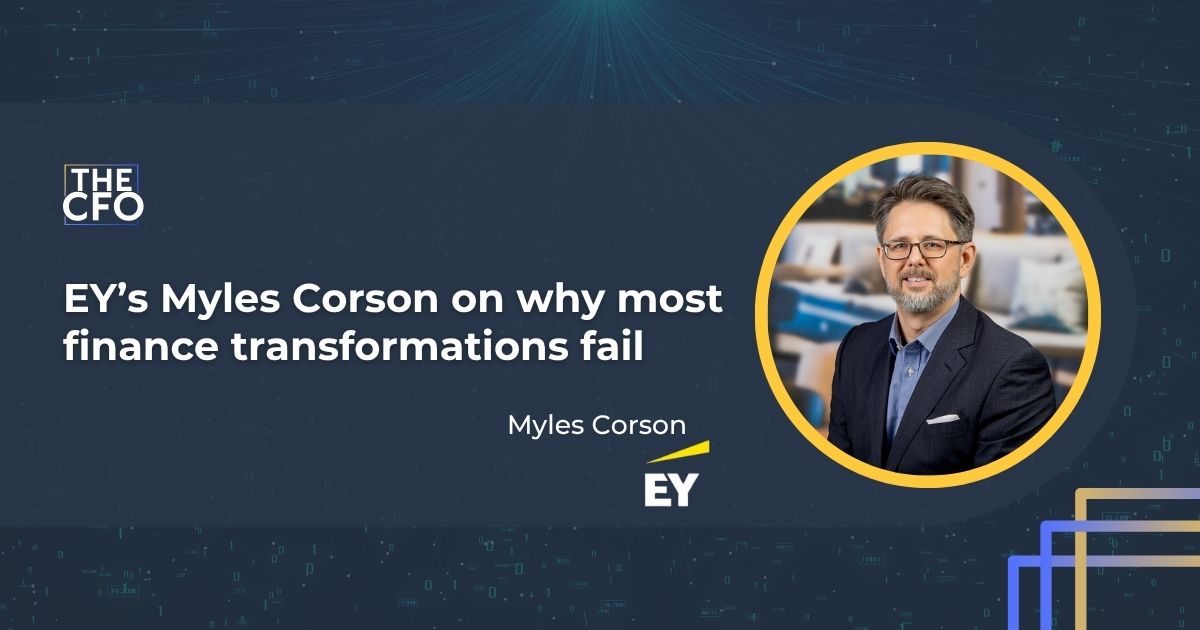Q&A: EY’s Myles Corson on why most finance transformations fail
What separates high-performing CFOs from the rest? EY’s Myles Corson explains why communication, narrative, and clarity—not just numbers—define today’s finance leaders.
What separates high-performing CFOs from the rest? EY’s Myles Corson explains why communication, narrative, and clarity—not just numbers—define today’s finance leaders.

After more than three decades inside EY and a front-row seat to some of the most disruptive financial transformations of our time, Myles Corson is well-versed in the evolving identity of the CFO.
As EY Global and Americas Strategy and Markets Leader for Financial Accounting Advisory Services, Corson’s role is a hybrid of research leader, client adviser, and seasoned translator between complex regulatory shifts and actionable boardroom strategy.
But what truly defines his perspective is his global lens and his insistence that today’s CFOs need more than analytical rigour: they need clarity, consistency, and communication.
“Communication and collaboration,” Corson says matter-of-factly, when asked what separates high-performing finance leaders from the rest. “Those two things are what differentiate successful CFOs, especially in the context of transformation.”
It’s a striking insight given the scale of transformation under way. In research conducted with the Oxford Saïd Business School, EY found that a staggering 75% of CFOs have experienced a failed transformation in the last five years.
In a business environment where transformation is no longer an event but a permanent state, that number reflects something deeper: a need for CFOs to become more human in how they lead change.
“It’s not just about articulating a clear vision,” he adds. “It’s about creating an environment where people feel comfortable experimenting, innovating, and driving change and where they are incented around the outcomes you want.”
The tension between long-term investment and short-term performance has always defined the CFO remit. But EY’s DNA of the CFO report quantifies just how fraught that balance has become: 67% of CFOs reported experiencing misalignment or disagreement within the C-suite.
“You want the debate. You want diversity of opinion. But you also need to bring the room to a decision,” Corson explains.
“The CFO is uniquely placed to do that. They have the numbers, the context, the credibility. They’re not just reporting on the strategy. Increasingly, they’re helping shape it.”
That means owning the narrative.
“Storytelling isn’t a skill traditionally associated with finance,” he acknowledges. “But it’s crucial. A good CFO must simplify complexity, communicate consistently, and tailor messaging for different stakeholders — whether it’s investors, the board, or their own finance team.”
Corson believes modern tools such as visualisation platforms and even social media are underutilised in this respect.
For CFOs in global organisations, showing up publicly—demonstrating values, explaining priorities, and making finance more human—can be a powerful way to complement formal reporting.
So how do finance leaders juggle being storytellers, strategists, compliance stewards, and transformation architects?
“It all comes back to clarity of vision,” Corson says. In times of uncertainty, employees look to the CFO not just for numbers, but for direction. “If your people understand where you’re heading, they can make better short-term decisions.”
The same principle applies when it comes to tech. Corson warns against getting swept up in hype: “Don’t look at AI or blockchain as hammers in search of nails. Ask: does this help achieve my outcome?”
Corson points to the “polycrisis” landscape—geopolitical volatility, macroeconomic swings, regulatory shifts—as a forcing function for CFOs to get very clear on which tools actually support their business goals.
This pragmatism is shaped by Corson’s conversations on the Better Finance podcast, where he regularly interviews global finance leaders. One standout guest: Corey Hrncirik, who leads Microsoft’s Modern Finance programme.
“People think AI will transform things overnight,” Corson says. “But Microsoft’s journey took time. It began with laying solid data foundations and making deep cultural changes.”
Corson draws a clear throughline across decades of research: the CFO role is evolving, but not in a flash. “It’s not a big bang. It’s a gradual, continuous transition. What’s constant is disruption.”
And yet, many finance leaders still say they want to be strategic partners but measure their teams only on cost and efficiency. This, Corson warns, is a misalignment that hampers credibility.
“If you claim to care about business partnership and strategic value, your KPIs should reflect that—maybe a Net Promoter Score from internal stakeholders, or metrics that track how finance is helping drive decisions.”
That requires taking calculated bets. Sometimes, Corson says, the ROI on a new technology won’t be immediately visible.
“Finance leaders need to move from deterministic to probabilistic thinking. You can’t expect every investment to yield a linear return. Some of the biggest breakthroughs come from placing thoughtful bets and learning as you go.”
So where should CFOs place their technology bets right now? Corson is careful not to offer a one-size-fits-all answer.
“You have to start with the problem. Don’t chase a trend. Define the outcome you want and then find the right combination of technologies to support that.”
Corson cautions against over-reliance on energy-intensive tools like agentic AI for tasks that could be automated more simply.
“Use the right tools for the right jobs. That’s how you create space to focus on high-value work—like driving growth or helping commercial teams make better decisions.”
And ultimately, that’s the CFO’s most important evolution: from protector of value to creator of it.
“Your role is to enable the business,” Corson says. “If your peers don’t see you as someone who helps them make better, faster, more informed decisions, you’re not yet where you need to be.”